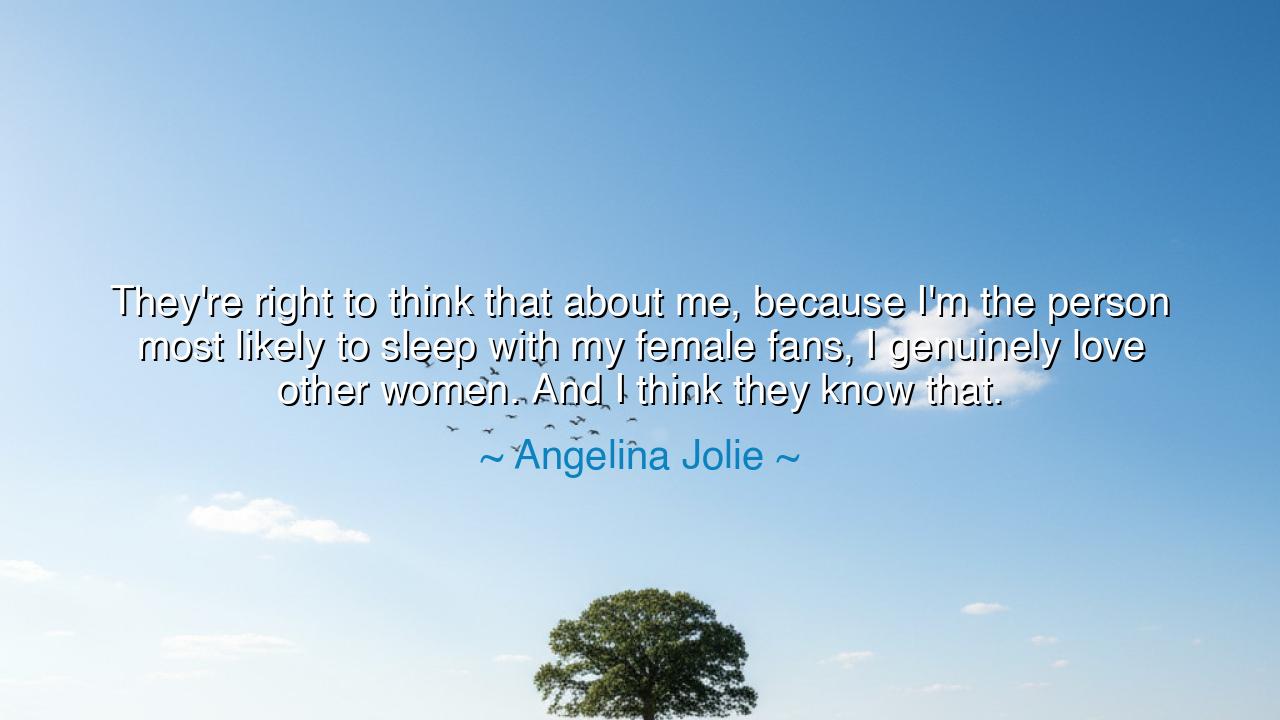
They're right to think that about me, because I'm the person
They're right to think that about me, because I'm the person most likely to sleep with my female fans, I genuinely love other women. And I think they know that.






The words of Angelina Jolie, “They’re right to think that about me, because I’m the person most likely to sleep with my female fans, I genuinely love women. And I think they know that,” fall with the candor of one unafraid of scandal, unafraid of truth. Beneath their provocation lies something ancient: the daring of a soul who refuses to wear the masks society demands. In declaring her love for women, Jolie does more than confess desire—she affirms solidarity, a bond of recognition, and the breaking of chains that long sought to bind women’s passion in silence.
From the earliest ages, desire outside the approved order was shunned and hidden. In ancient Athens, Sappho of Lesbos raised her voice in lyric poetry, singing openly of her love for women. Though centuries sought to bury her words, her verses endure, reminding us that the love of women for women is as timeless as the love of man and woman. Jolie’s declaration, bold in its modern tongue, is heir to this same flame: the courage to love without apology, to honor passion as a form of truth.
Yet there is more. Jolie does not merely speak of desire but of genuine love. Her words suggest that her fans—women who look to her not only as an actress but as an emblem of strength—sense in her an openness of spirit, a refusal to feign distance. Where many idols stand aloof, she stands near, vulnerable, human. This intimacy, though dangerous in its honesty, creates a bond deeper than mere celebrity. It echoes the ancient role of the muse and the goddess, who drew followers not only through beauty but through recognition of shared humanity.
The history of queens and empresses reveals the same paradox. Cleopatra of Egypt, though famed for her liaisons with men, also commanded love and loyalty from women of her court, not only through power but through charm and solidarity. She embodied the dangerous mixture of desire and admiration that Jolie here names: to be loved not just from afar, but with the dangerous intimacy of one who could cross the boundary between idol and equal.
So let the future generations learn: in these words lies not scandal, but the lesson of authenticity. To love freely, to admit desire openly, to acknowledge the bonds between women, is to defy the world’s expectation of silence. Jolie’s boldness is not merely about passion, but about the right of each soul to speak its truth without shame. In such honesty lies power, and in such power lies the freedom for others to be unafraid.






TLTa Thi Thuy Linh
I find Angelina Jolie's comment intriguing, but I also question the underlying implications of her words. By explicitly stating her attraction to women, is she reinforcing a stereotype about celebrity culture and their relationships with fans? Should her personal preferences be a point of public discussion, or should such private matters remain just that—private?
QCTRAN QUYNH CHI
While it's refreshing to see Angelina Jolie speak candidly about her attraction to women, I’m left wondering how this statement fits with her broader public image. Is her claim a testament to her confidence and freedom, or is it potentially problematic when discussing the dynamics between celebrities and their fans? Does this dynamic challenge or reinforce traditional power structures in relationships?
HAHai Anh
Jolie’s statement could be seen as a bold and unapologetic acknowledgment of her romantic preferences. But does it risk oversimplifying complex human emotions? Is reducing relationships and attraction to mere physicality potentially harmful or empowering? How does this affect the perception of her character, both in the public eye and within the context of her advocacy for women’s rights?
TNNguyen Thanh Nhu
Angelina Jolie's statement seems to blur the line between self-expression and objectification. While it may be empowering to openly acknowledge her feelings for women, it also risks perpetuating stereotypes about celebrity relationships. How much of this quote reflects genuine self-identity versus the persona crafted for public consumption? Does her openness reinforce or undermine the respect people may have for her as a woman and a public figure?